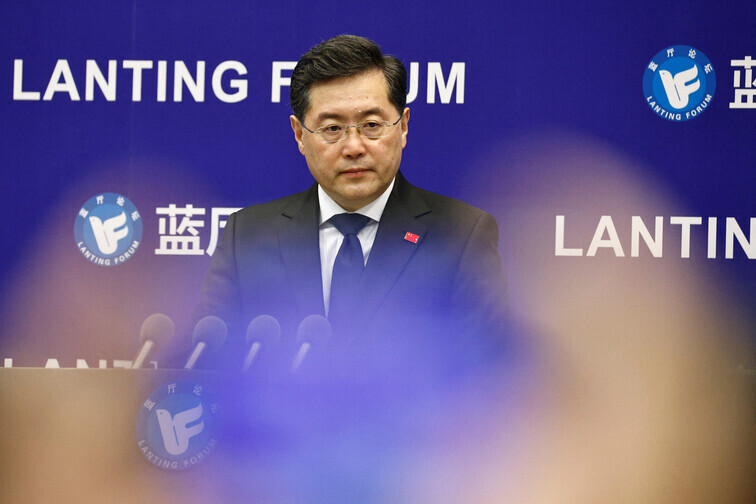hankyoreh
Links to other country sites 다른 나라 사이트 링크
Xi firms up security framework meant to counter US-led world order

China has shared the content of its Global Security Initiative (GSI), which it intends as an alternative global security framework to counter the US-led international order.
The move is being interpreted as a concrete foreign step being taken by President Xi Jinping as he begins his third term.
The Chinese Foreign Ministry released a document on Tuesday that included its concept for the GSI and held a forum to explain the details, according to sources including the People’s Daily, the official newspaper of the Chinese Communist Party.
First announced by Xi in April 2022 at the Boao Forum for Asia in China’s Hainan Province, the GSI is a security concept that presents a more systematic and fleshed-out vision for China’s international security. The participants in the forum on Tuesday included ambassadors, diplomats, and representatives from a total of 137 countries and international organizations.
“What security concepts does the world need? How can countries achieve common security? These are the questions of this era facing us all,” said Chinese Minister of Foreign Affairs Qin Gang in his explanation of the document on Tuesday.
“The GSI intends to serve the interests of all and protect tranquility for all. Its advances need the unity and cooperation of the international community,” he added.
“The development of a big country like China cannot happen without a secure international environment. Likewise, world security would not be possible without the security of China,” he said.
Qin went on to say that “over 80 countries and regional organizations have expressed their appreciation and support” for the GSI.
“China wishes to work with all countries in the direction set out in the GSI, and move together in unity and cooperation toward a brighter future of lasting peace and universal security,” he continued.
Indeed, representatives of Arab countries met with Xi and expressed their support for China’s GSI during a China-Arab States summit held in December of last year.
The document included six principles for global security and 20 specific areas for cooperation. Its content essentially reiterated what Beijing has consistently been arguing in connection with international security.
The six principles stated that the cornerstone of international relations lay in “respecting the sovereignty and territorial integrity of all countries” and in “sovereign equality and non-interference in internal affairs,” along with compliance with the UN Charter and the rejection of “Cold War mentality, unilateralism, bloc confrontation and hegemonism.”
In terms of the 20 directions for cooperation, the document stressed the need to uphold security agreement frameworks that have been signed among countries in Southeast Asia, the Middle East, Africa, and Central and South America. It also called for cooperation on global issues related to food, energy security, climate change, infectious disease containment, space security, and terrorism.
Going forward, China appears likely to use the GSI content announced Tuesday as a basis for putting together regular conferences or a consultative framework among countries. Qin said that China planned to “begin senior-level Global Security Initiative activities and jointly discuss security plans with other countries at an appropriate time.”
The Financial Times said the document’s content “mainly rehashed principles that had been part of China’s foreign policy for years,” but added that “the push for regular conferences and government consultations was a novel development.”
Zhang Guihong, a professor at the Fudan University UN Studies Centre in Shanghai, said, “It should be like the Munich Security Conference, but that is organized by the west, and China would like to have its own.”
Zhang also said China was likely to start organizing regular meetings with foreign, defense, and interior ministers from countries affiliated with the GSI.
Since 2021, China has also been operating a Global Development Initiative aimed at reducing global poverty and supporting developing economies.
By Choi Hyun-june, Beijing correspondent
Please direct questions or comments to [english@hani.co.kr]

Editorial・opinion
![[Editorial] Intensifying US-China rivalry means Seoul must address uncertainty with Beijing sooner than later [Editorial] Intensifying US-China rivalry means Seoul must address uncertainty with Beijing sooner than later](https://flexible.img.hani.co.kr/flexible/normal/500/300/imgdb/original/2024/0517/8117159322045222.jpg) [Editorial] Intensifying US-China rivalry means Seoul must address uncertainty with Beijing sooner than later
[Editorial] Intensifying US-China rivalry means Seoul must address uncertainty with Beijing sooner than later![[Column] When ‘fairness’ means hate and violence [Column] When ‘fairness’ means hate and violence](https://flexible.img.hani.co.kr/flexible/normal/500/300/imgdb/original/2024/0516/7417158465908824.jpg) [Column] When ‘fairness’ means hate and violence
[Column] When ‘fairness’ means hate and violence- [Editorial] Yoon must stop abusing authority to shield himself from investigation
- [Column] US troop withdrawal from Korea could be the Acheson Line all over
- [Column] How to win back readers who’ve turned to YouTube for news
- [Column] Welcome to the president’s pity party
- [Editorial] Korea must respond firmly to Japan’s attempt to usurp Line
- [Editorial] Transfers of prosecutors investigating Korea’s first lady send chilling message
- [Column] Will Seoul’s ties with Moscow really recover on their own?
- [Column] Samsung’s ‘lost decade’ and Lee Jae-yong’s mismatched chopsticks
Most viewed articles
- 1[Editorial] Transfers of prosecutors investigating Korea’s first lady send chilling message
- 2For new generation of Chinese artists, discontent is disobedience
- 3S. Korea “monitoring developments” after report of secret Chinese police station in Seoul
- 4Xi, Putin ‘oppose acts of military intimidation’ against N. Korea by US in joint statement
- 5[Exclusive] Unearthed memo suggests Gwangju Uprising missing may have been cremated
- 6N. Korean media upgrades epithet for leader’s daughter from “beloved” to “respected”
- 7Yoon says concern about biased diplomacy is being incited by “communist totalitarian forces”
- 8[Editorial] Intensifying US-China rivalry means Seoul must address uncertainty with Beijing sooner t
- 9[Column] Samsung’s ‘lost decade’ and Lee Jae-yong’s mismatched chopsticks
- 10[Special reportage- part I] Elderly prostitution at Jongmyo Park